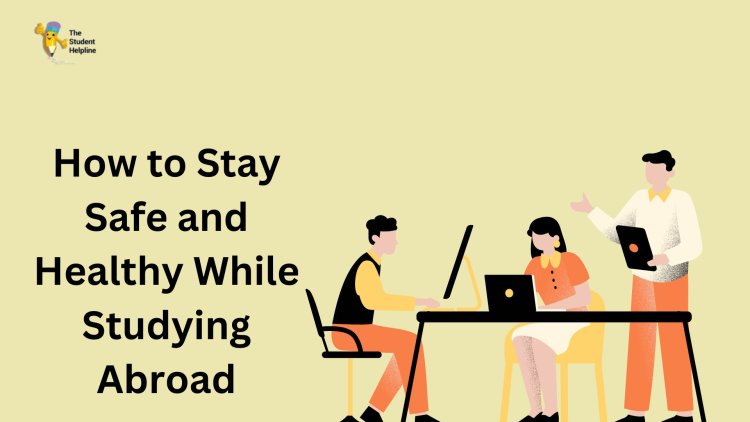How to Stay Safe and Healthy While Studying Abroad
Stay safe and healthy while studying abroad with these expert tips. From preparation to emergency planning, ensure a stress-free study experience.
Share this Post to earn Money ( Upto ₹100 per 1000 Views )

Studying abroad is an exciting opportunity to immerse yourself in a new culture, gain quality education, and expand your horizons. Whether you’re planning to study in the UK or another destination, ensuring your safety and well-being is crucial for a fulfilling experience. With the help of a study abroad consultant, you can plan for both academic and personal success. This guide will provide you with essential tips to stay safe and healthy during your time abroad.
The Importance of Safety and Health While Studying Abroad
When you embark on your study abroad journey, you’re stepping into a new environment with unfamiliar systems, cultural norms, and challenges. Staying safe and healthy ensures you can focus on your education and make the most of your time in a foreign country. Preparing in advance and adopting good practices can help you navigate any difficulties with confidence.
Preparation Before You Travel
Research Your Destination
Before traveling, familiarize yourself with your destination’s cultural norms, laws, and local safety conditions. For instance, if you plan to study in the UK, learn about its healthcare system, public transportation, and local emergency contacts.
Cultural Awareness: Understand the social etiquette and customs of the country. What might be acceptable in your home country could be considered offensive elsewhere.
Emergency Contacts: Make a list of local emergency numbers, such as police, ambulance, and your country’s embassy.
Neighborhoods to Avoid: Research safe neighborhoods near your accommodation and university.
Consult a Study Abroad Consultant
A study abroad consultant can provide valuable insights into the safety and health resources available at your chosen destination. They can guide you on finding student-friendly accommodation, registering for healthcare, and understanding travel insurance options.
Get Comprehensive Travel Insurance
Travel insurance is essential for covering unexpected medical expenses, lost belongings, or travel delays. Ensure your policy includes:
Medical emergencies and hospitalization.
Coverage for chronic conditions or pre-existing illnesses.
Repatriation services in case of serious illness or injury.
Vaccinations and Health Check-ups
Visit your doctor to ensure you’re up to date on vaccinations required for your destination. Depending on the country, you may need vaccines for diseases such as hepatitis, typhoid, or yellow fever. Carry a copy of your medical records and a list of prescribed medications.
Staying Safe While Studying Abroad
Secure Accommodation
Choose accommodations that prioritize safety. Whether you opt for university housing or private rentals, ensure the following:
The building has secure entry systems.
The area is well-lit and monitored.
There are functioning smoke detectors and fire safety measures.
A study abroad consultant can recommend trusted housing options near your university.
Be Vigilant with Personal Belongings
Pickpocketing and theft are common risks in many tourist-heavy areas. Protect your belongings by:
Keeping valuables, such as passports and credit cards, in secure bags.
Using anti-theft backpacks or money belts.
Avoiding carrying large sums of cash.
Learn Basic Self-Defense and Awareness
Taking a basic self-defense class can boost your confidence. Additionally, always:
Avoid isolated areas, especially at night.
Inform friends or roommates of your whereabouts.
Use trusted transportation options, such as licensed taxis or rideshare apps.
Stay Informed About Local Laws
Different countries have unique laws regarding alcohol, drugs, and public behavior. Ignorance of local laws can lead to serious consequences. Stay informed to avoid unintentional violations.
Maintaining Your Health While Abroad
Register with a Healthcare Provider
If you’re planning to study in the UK, register with the National Health Service (NHS) as an international student. Many countries require students to have access to healthcare during their stay. A study abroad can help you navigate the registration process.
Establish Healthy Routines
Adapting to a new environment can disrupt your daily habits. Maintain a healthy lifestyle by:
Eating balanced meals, even if you’re on a budget.
Staying active with regular exercise or walks.
Getting sufficient sleep to avoid burnout.
Mental Health Support
Being away from home can lead to homesickness, anxiety, or stress. To manage your mental health:
Utilize counseling services offered by your university.
Stay connected with family and friends through video calls.
Join student groups or cultural organizations to build a support network.
Manage Pre-Existing Conditions
If you have ongoing medical needs, plan ahead by:
Carrying enough medication for your stay or arranging refills.
Informing your university’s health center about your condition.
Keeping an emergency contact list for healthcare providers in your area.
Practical Tips for Emergency Situations
Know What to Do in Case of an Emergency
Understanding how to respond in emergencies can save lives. Key steps include:
Calling local emergency services for immediate help.
Contacting your university’s international student office for guidance.
Informing your country’s embassy if needed.
Stay Connected
Always keep your phone charged and carry a power bank. Save important numbers, including:
Local emergency services.
Your university’s emergency hotline.
Friends or roommates you trust.
Be Prepared for Natural Disasters
Some regions may be prone to earthquakes, floods, or other natural disasters. Familiarize yourself with local emergency protocols and evacuation routes.
Leveraging University and Community Resources
Use Campus Safety Services
Most universities offer resources to help students stay safe, including:
Campus security escorts for late-night travel.
Safety apps with emergency alerts.
Health and wellness workshops.
Join Local Communities
Engaging with local communities can enhance your cultural experience and provide a safety net. Join:
Student organizations or cultural groups.
Volunteering programs.
Local clubs related to your hobbies or interests.
Conclusion
Studying abroad is a life-changing experience that comes with exciting opportunities and challenges. By taking proactive steps to prioritize your safety and health, you can fully immerse yourself in your academic journey and cultural exploration. Whether you’re planning to study in the UK or elsewhere, a study abroad consultant can guide you through the process, ensuring your transition to a new country is seamless and stress-free. With careful preparation and a commitment to self-care, you can thrive in your study abroad experience and create memories that will last a lifetime.















